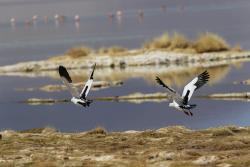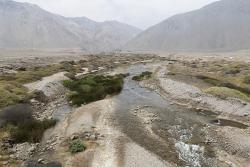The company’s star expansion project will potentially provoke serious impacts for the environment, Indigenous peoples and the workforce.
Report Highlights
-
The Quebrada Blanca Phase II (QBP2) Expansion Project will require more than 4.7 billion dollars in capital investment and is financed by Japanese and Canadian banks and finance corporations.
-
The expansion project is an open-pit copper-molybdenum-silver mine which contemplates a life-of mine of over 25 years, with a capacity of 140,000 tonnes per day (tpd). Following construction the mine will be one of the largest mines in Chile and among the 20 largest mines in the world. It is being erected atop of the existing pit in the Tarapacá region – an area of Chile that is already saturated with large-scale mines.
-
Since groundwater resources cannot satisfy the needs of the expansion – due to overuse by the mine’s existing operations – QBP2 will include building a seawater desalination plant in Patache Bay, using aqueducts to transport the water 159 km from the sea, climbing 4400 m in altitude to the mine site.
-
Potential impacts identified include: loss of wetlands, loss of flora and fauna in danger, loss of cultural heritage of the Indigenous Aymara and Quechua communities, as well as impacts to the Indigenous traditional land use, impacts to the hydrological system and impacts to the health of the workforce.
(Santiago de Chile/Ottawa) A new report, published by the Environmental Conflicts Observatory in Chile (OLCA in Spanish) and MiningWatch Canada, reveals worrying findings about the open pit Quebrada Blanca Phase II expansion project in Tarapacá, Chile.
Quebrada Blanca is owned by Canadian company Teck Resources (60%), Japanese companies Sumitomo Metal Mining Co., Ltd. and Sumitomo Corporation (30%), and the Chilean state company ENAMI (10%). The mine has been in operation since 1994.
The QBP2 expansion project, now under construction, will be one of the largest mines in Chile. This, in a region where generations of Indigenous and Chilean families, as well as the flora and fauna, have been suffering the consequences of Chile’s hyper-extractivist mining model. Since 2006, the project has produced 75 million tons of copper, and the expansion aims to increase capacity to 140,000 tpd for more than 25 years. The companies indicate the potential for a subsequent third phase expansion.
Due to the intensive consumption of water and electricity, the extensive network of transportation pipelines, the construction of a desalination plant, and the expansion of production capacity and thus the volume of waste generated, the report highlights many impacts of great concern for the Indigenous communities and other populations close to the installations and the mine, as well as the flora and fauna of the region.
“We are very concerned that Indigenous communities were tossed aside by the company in the Environmental Impact Study for the project’s expansion, and that the Consultation Process for Indigenous Peoples was denied by the Environmental Impact Service in Chile. This is infuriating given that these same communities have experienced the impacts of years of exploitation of the Quebrada Blanca mine,” said María Paz López, a researcher at OLCA and co-author of the report.
On its website, majority owner Teck Resources identifies eight “Strategic Priorities” which include Indigenous Peoples, Biodiversity, and Climate Change. It recently launched a goal of achieving carbon neutrality at its operations by 2050.
Kirsten Francescone, Latin America Program Coordinator at MiningWatch Canada and co-author of the report, said,“Despite its public concerns to mitigate the contribution of its mines to climate change, the report shows us that beyond operating several contaminating coal mines in Canada, Teck’s commitment to the environment is purely discursive. In practice, this mine will, without a doubt, contribute to exacerbating the Chilean ecological crisis.”
Due to the huge investment required for the expansion, the companies acquired financing from banks and international development corporations in 2019. Among these are various Japanese banks, as well as Export Development Canada (EDC).
“The fact that EDC is financing this project is yet another indicator that the Canadian government’s commitment is not to counter climate change, but is in fact with the economic interests of large mining companies,” said Francescone.
In March, construction on QBP2 was suspended due to the COVID-19 pandemic. It was reactivated, only a few weeks later, clearly prioritizing the economic interests of the companies over the health of the workers and the communities.
“For many years, mega-mining in Chile has wreaked havoc upon the territories where it is imposed. These mega-projects destroy the ways of life of the communities and their ecosystems. Today, even during the pandemic, these projects continue to advance, without taking into consideration the territories or the health of the workers. The Canadian government should assume its extraterritorial responsibility for its companies who violate human and collective rights of Peoples, especially those who count on financing and political support,” said Lucio Cuenca, OLCA’s Director and co-author of the report.
You can find the report here.
For more information, or to set up interviews, contact:
- María Paz López, OLCA, +56 9 5067 3150 (English and Spanish)
- Lucio Cuenca, OLCA, +56 9 9240 2706 (Spanish)
- Kirsten Francescone, MiningWatch Canada, +1 437 345 9881 (English and Spanish)

